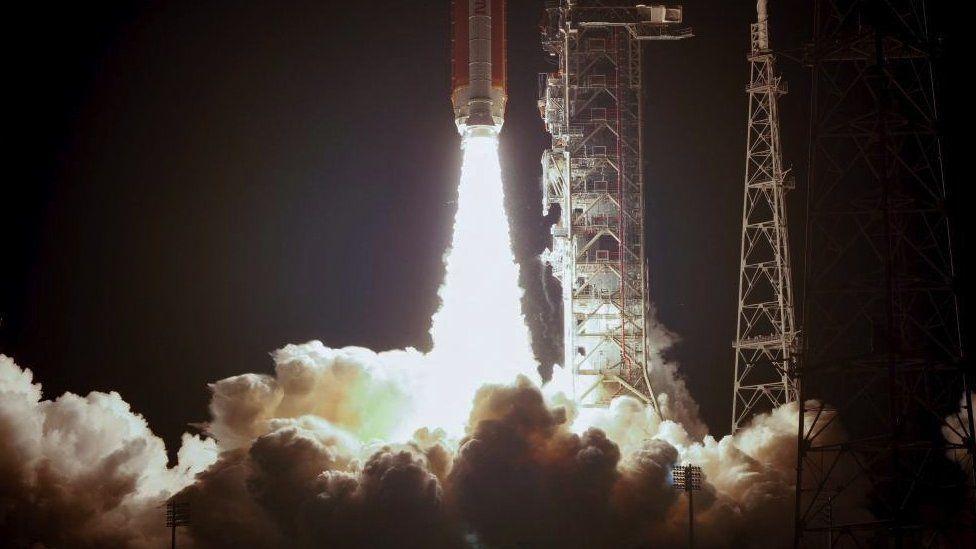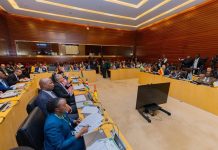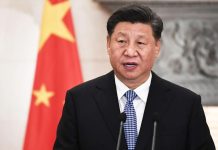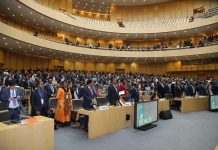Africa-Press – Lesotho. There is a new order emerging in space – a race between America and China. But with the demands of space exploration, even these great superpowers won’t be able to do it alone.
Hugely technically challenging and costly goals have been touted, not least the aim of people living and working on other worlds, possibly within ten years – but in a divided world where international good will is scarce, are they realistic?
Nasa’s return to the Moon has begun with its Artemis programme. The first of three missions has been successfully launched. This uncrewed flight tested that the rockets and technology worked.
The second mission will take humans further in space than they have ever gone before and the third launch will put astronauts on the Moon for a week, where they will carry out experiments.
The long-term goal is to use the Moon as a jumping off point to get to Mars. But the programme is estimated to cost $93bn (£76bn), a heavy price tag for the American taxpayer, who is already feeling the economic squeeze.
In a report to Congress last year, the US Auditor General’s office warned of an “unrealistic development schedule” and likely overruns, adding that Nasa needed to make cost estimates “more reliable and transparent”.
Yet although Nasa will get less overall funding than it asked for in 2023, Congress, at the moment, still supports its human space exploration ventures.
China has achieved its own fully operational space station, Tiangong, in orbit on schedule. The Chinese space programme has launched probes to the Moon and Mars.
It plans to establish an unmanned research station on the Moon by 2025 and then land astronauts on its surface by 2030. Pallab Ghosh and Kate Stephens look at the rapid expansion in space exploration which will lead to people living and working on other worlds.
Putting an astronaut on the Moon has been done before but the next step, to Mars, is much more difficult. It is 250 times further away than the Moon and there is no spacecraft currently capable of sending humans to the red planet.
Even if scientists can find a safe way to launch a fuel-heavy rocket and land it on a planet with such a thin atmosphere, there is the further challenge of returning the astronauts safely home after months in space.
Historically superpowers have jostled for supremacy above the Earth. America and Russia vied for dominance in the 1950s and 1960s. The Russians put the first man in orbit.
The Americans landed a man and planted their flag on the Moon a few years later. In the 1970s a golden era of cooperation was forged culminating in the construction of the International Space Station (ISS), which began in 1998.
Along with 13 other partner nations, the two superpowers built what is now the largest structure in space. It is not owned by any one nation, and each depends on the other to operate.
It was a symbol of what humanity could achieve if nations put aside their differences and worked together. But the reality was somewhat different. Notably America prevented China from becoming a partner in the ISS, so the Chinese went their own way.
More recently, within weeks of the invasion of Ukraine, nations stopped working with Russia. Two joint Moon missions between the European Space Agency (ESA) and Russia have been cancelled, as has a joint Mars Rover project to search for signs of life on the red planet.
Yet scratch the surface and collaboration continues on the ISS, where Western countries have to work with Russia to maintain it in orbit. Americans and Europeans even still train in the centre of Moscow at Russia’s Space HQ, Star City.
But what happens once the ISS comes to the end of its lifetime in 2030? Juliana Suess, a space policy analyst at the Royal United Services Institute think tank in London says Russia has much less to offer partner nations than it once did because its technology is outdated.
She raises the possibility that the first nation into space could be the first one out. “If the Russians haven’t figured out an alternative by the time the ISS is decommissioned or develops its own space station, which given the current circumstances and sanctions is quite unlikely, it might not have any human spaceflight,” she says.
Russia’s plight comes at a time when China’s space programme is advancing rapidly. In the last ten years it has launched more than 200 rockets, even though America’s spending on space still makes China’s look small.
China is mindful that partnerships offer technical know-how and money. It has invited other nations prohibited from access to the ISS to join them and has made a call for proposals for scientific experiments.
Seventy-two countries now have their own space programmes because they can’t afford to be left behind in what has become a new space race. The billionaire spacefarers
Space is a vital part of our everyday lives. We depend on satellites for weather forecasts, communications, bank transactions, not to mention valuable surveillance tools for nation states.
And it’s getting busy out there. In 2021 about 5,000 satellites were launched. Going back 20 years, about 800 were launched annually. Space is an expensive and technically difficult business.
No one country can do it alone. New partnerships are being forged, notably with the new brash billionaires on the block. Elon Musk’s company, SpaceX, is already taking passengers into orbit.
The billionaire entrepreneur is bringing down costs with a reusable rocket. Not to be outdone, Amazon’s Jeff Bezos wants to build a commercial orbiting station, called Orbital Reef.
Helen Sharman, who was the UK’s first astronaut, on a mission to the Soviet Space Station Mir in 1991, believes that current international rivalries could be put in the shade by the pragmatism of the private sector.
“It really is going to be commercialisation that brings companies together worldwide,” she told the BBC.
“We don’t care where they are registered, what matters is what they do for the benefit of the world.
” The prospect of financial gain and scientific discovery drives collaboration. Private companies may help to bring a new cooperation in space but they have to obey the laws of their home country.
When nations imposed sanctions on Russia in 2022 firms were obliged to withdraw from contracts with Russia. Dr Josef Aschbacher, who is head of the European Space Agency, is determined to keep Europe in the new space race.
He has recently had a £2bn ($2.4bn) increase in funding, despite the financial squeeze facing governments. “Space is one of those sectors which is expanding very fast and much faster now than in the last few decades.
We cannot lose out,” he told the BBC. “We really need to participate strongly in this sector because I want to create new business opportunities for companies in our member states to participate in.
” It will be nations that lead space exploration of the future. But the challenges will require them coming together as a single group or “bloc” of countries to share information and to compete with other blocs.
The European Space Agency has been doing this successfully for years. New laws for space But what is potentially going to hold back the next big push to other worlds is the set of international laws governing space.
The marvellously named “Outer Space Treaty” has not been updated since it was signed in 1967, when 31 nations, including the US and the Soviet Union, pledged not to have nuclear weapons in space.
According to Juliana Suess of the Royal United Services Institute, it is not fit for purpose. “It doesn’t talk about companies; it doesn’t talk about billionaires,” she said.
“Space is entirely different to what it was like in 1967.
”
New rules to regulate the commercial exploitation of the Moon, Mars and beyond were introduced by the UN in 1979 but the US, China and Russia have all refused to sign it.
ESA’s Josef Aschbacher believes the new space race will be hampered until a new outer space treaty is hammered out. “In space we are using the same orbits for satellites, using the same Moon surface for China, the US, Europe,” he said.
“We need a way to work together to establish rules of engagement and establish rules of how we work there.
For More News And Analysis About Lesotho Follow Africa-Press






